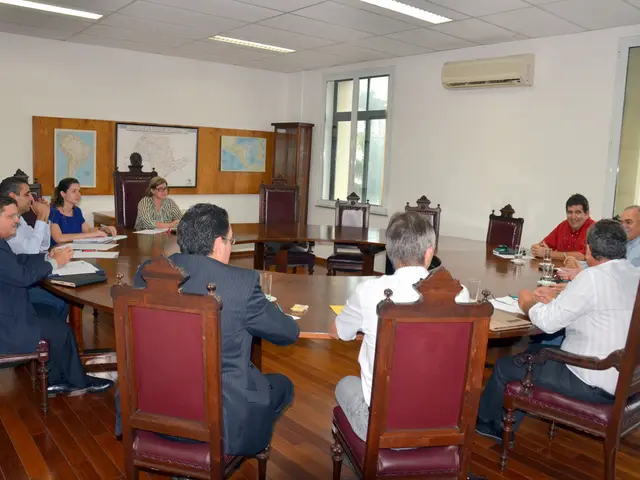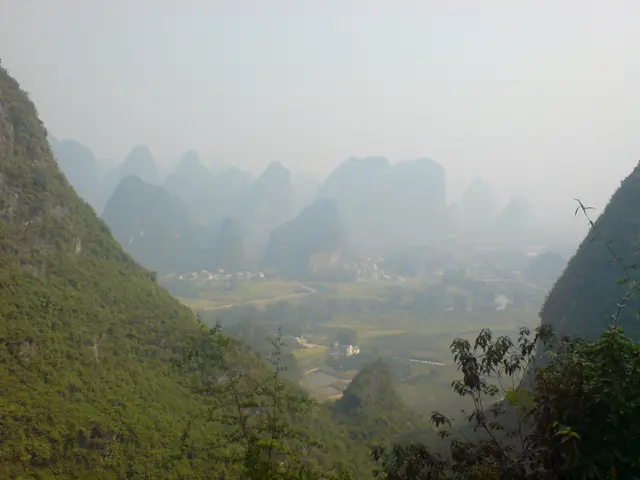Tit-for-Tat Tensions: Pakistan's Prime Minister Retaliates against Indian Aggression
- ~ 4 Min
Pakistan's Leader Declares Retaliation Against IndianAssaults - India-originated Attacks Met with Retaliation: Pakistan's Prime Minister Declares Counteraction
In a stark display of territorial defiance, Pakistan has been rattling its sabers, threatening to retaliate following a series of devastating Indian attacks on Pakistani soil. The threat came from none other than Pakistan's Prime Minister, Shehbaz Sharif, after a top-level security conference. Sharif made it crystal clear that the Pakistani military has been given the green light to counterattack at a time, location, and manner of choosing, issuing a warning laced with steel and determination.
The fuse was lit after a series of Indian assaults on Pakistani targets, including those within Pakistan-administered Kashmir, in response to a terrorist attack in the contentious region nearly two weeks ago.
The violence peaked on April 22, with armed attackers striking in the Indian-controlled part, leaving 26 people, predominantly Indian tourists, lifeless in a tourist area near Pahalgam. India's government has accused Pakistan of complicity in the attack, a claim that Pakistan vehemently denies.
The latest Indian attack overnight on Wednesday (local time) has stoked fears of a full-blown conflict between the nuclear-armed nations, rekindling concerns about a devastating war between the two nations.
The Human Toll
In the crossfire, both civilians and military personnel have suffered. Pakistan reported 26 dead and 46 injured, with women and children amongst the fatalities. Intelligence sources initially reported a child killed in Bahawalpur, a city in eastern Pakistan.
The Pakistani military claims that the attacks were carried out using rockets. The Pakistani army reportedly downed five Indian jets, including three Rafale fighter jets and one each of MiG 29 and SU aircraft, during their foray into Pakistani airspace. India, however, has yet to acknowledge these claims.
India reported that at least eight people were killed in Indian-controlled Kashmir due to Pakistan's retaliatory fire. The border town of Poonch saw 29 injuries, according to a local administrator. The Pakistani military was accused of indiscriminate firing across the Line of Control (LoC), a de facto border that separates Kashmir between the two nations.
Targeted Destruction
The Indian Defense Ministry justified the attacks on numerous targets within Pakistan and Pakistan-administered Kashmir as a response to the attack that originated from these locations nearly two weeks ago. The targets deemed "terrorist infrastructure" were identified for destruction. Reportedly, nine such targets were successfully hit, with Pakistan's military installations explicitly off the table. The Indian Defense Ministry framed the actions as "surgical, measured, and non-escalatory."
Initially, Pakistan's intelligence sources and military reported that the cities of Kotli and Muzaffarabad in the Pakistani-controlled part of Kashmir, along with the city of Bahawalpur in Punjab province, were targeted. A mosque in Bahawalpur was allegedly hit in the attack.
The Skies Close
Following the Indian attacks, Pakistan closed its airspace for 48 hours, halting operations at major airports in Islamabad and Lahore indefinitely.
Guterres's Grave Concerns
UN Secretary-General António Guterres expressed "grave concern" following the attacks, stating, "The world cannot afford a military confrontation between India and Pakistan." He urged both nations to show restraint and avoid further escalating the situation.
Trump's Hope for Peace
US President Donald Trump expressed his hope that the conflict would deescalate soon.
The Competition over Kashmir
Since the attack nearly two weeks ago, both nations have imposed economic sanctions, expelled each other's citizens, and significantly reduced diplomatic ties. The suspension of the Indus Water Treaty by India was viewed as particularly concerning, as it governs water usage on both sides of the Indus and its tributaries. Pakistan initially termed the suspension an act of war and threatened reciprocal measures.
The Kashmir region, nestled in the Himalayas, has long been a bone of contention between Pakistan and India, who both stake claims to its entirety. The roots of the conflict can be traced back to the colonial era, when the British partitioned India and created Pakistan as a separate nation for Muslims. The violent partition continues to fuel bitter rivalry between the two nations, resulting in three wars – two of which were fought over Kashmir.
- India
- Pakistan
- Kashmir
- Enrichment Insights:
- The recent escalation in the conflict between India and Pakistan has led to tensions that have not been seen since 2019, potentially signaling a new and dangerous phase in the long-standing dispute.
- A military official in Pakistan has stated that India's airspace could remain closed for an extended period due to the ongoing hostilities, which could have significant consequences for regional and international travel.
- Both India and Pakistan have recently expelled diplomats from each other's embassies, further straining relations.
- Russia and China have expressed concerns over the escalating conflict, with China hinting at its potential role as a mediator in disputes between the two nations.
- Experts have highlighted the risk of "miscalculation" by either side's military, emphasizing the inherent dangers of a nuclear-armed war between India and Pakistan.
- The Commission has also been consulted on the draft directive amidst the escalating tensions between India and Pakistan.
- While the political fallout, general news, and war-and-conflicts dominate the discourse, it's crucial not to forget the plight of the Pakistani citizens caught in the crossfire.
- On Tuesday, the Pakistani Ministry of Commerce announced targets aimed at bolstering economic relations with other countries in the wake of India's economic sanctions.
- In the midst of these targeted installations, Pakistani political leaders have been consulting with their counterparts worldwide in an effort to navigate the complex web of international politics.








